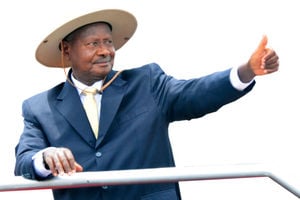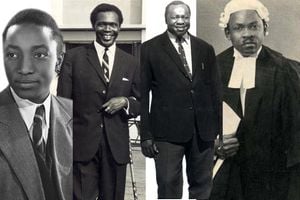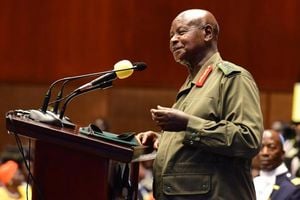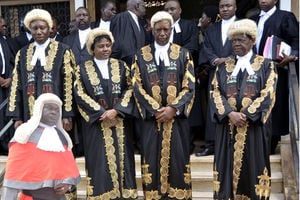
Commander Museveni talking to young NRA soldiers during the bush war. FILE PHOTO
Next Friday will be Friday the 13th. While it is widely considered an unlucky day in Western superstition, the day does not pass by without notice in Uganda. Misfortune or simply bad luck is something Ugandans are deeply wary of. That is because Ugandans are, at heart, superstitious.
Friday the 13th belongs to the Hall of Fame when it comes to the cultural conversation on all matters voodoo. It terrifies many, seemingly steeped in the sort of bad luck that follows you around like a knife-wielding ex-lover.
There’s even a name to capture that fear like a genie in a bottle: paraskevidekatriaphobia—a specialised form of triskaidekaphobia, a fear of the number 13.
We cannot be sure why this date is ominous to many in the West. But at the Last Supper, attended by Jesus Christ and his disciples, the 13th guest to arrive, Judas Iscariot, was the disciple who betrayed Jesus, leading to his crucifixion on Good Friday.
Although the date has not yet filtered deep into the Ugandan psyche, it should be noted for its link to President Museveni’s vise grip on power and the rise of militarism in the country.
Militarism in Uganda
In 2017, Busingye Kabumba, Dan Ngabirano and Timothy Kyepa made a literary splash as they took a deep dive into the history of militarism in Uganda with their book titled Militarism and the Dilemma of Post-Colonial Statehood. In brief, the book tells us that conflict in Uganda since 1962 implies that “the strongest will govern.”
It is such a Darwinian reality, our every existence is beclouded with the stark reminder that he who can blow your brains out must never be trifled with. Although we did not start looking down the barrel of a gun to see our future in 1986, President Museveni has cemented militarism in Uganda in ways that will be hard to deconstruct for many years to come. At two crucial junctures in our history, Mr Museveni dug in his heels to change its course. At both of these junctures, the date Friday the 13th looms with Damoclean menace.
Rise, fall of Lule
Yusuf Kironde Lule served as president of Uganda from Friday April 13 to Wednesday June 20, 1979. The former university don was sworn in two days after Kampala had fallen to the advancing combined force of Tanzanian and Ugandan fighters. The rump of this force, on the Ugandan side, was the Front for National Salvation (Fronasa), led by Mr Museveni.
Some estimates say Mr Museveni managed to assemble a strike force of thousands of adventurists as he descended on Kampala with more than a fundamental change speech. To be fair, he probably had not even written that speech by then. Still, it had been written in the stars that Lule was a fall guy for dark forces aiming to enshroud the country in hooded conspiracies to entrench the military.
Obote’s say
In Apollo Milton Obote’s 1990 pamphlet, Notes on Concealment of Genocide in Uganda, it is revealed how the bad luck of Friday 13th doomed Lule’s presidency from the get-go.
“The issue had been compounded in April 1979. On April 13, 1979, Lule, the new President of Uganda, was sworn by Justice Sam Wambuzi on the 1963 Oath—the "Sovereign State of Uganda" and not on the 1967 Oath, the "Republic of Uganda.” Within days, George Kanyeihamba, Lule's Attorney General and Minister of Justice, produced Proclamation No.1 of 1979 (New Constitution) and Lule signed it,” Obote wrote.
“The National Consultative Council (NCC) was not consulted. In the Kanyeihamba/Lule Proclamation, certain chapters of the 1967 Constitution were left intact, others were amended but Chapter IV—the Executive; i.e., the Presidency, was completely deleted. The effect was that by the Proclamation, Lule ceased to be the President of Uganda,” he added.
Regrettably, Lule’s ouster after only 68 days in office led to a crimson tide, so to speak.
“At the fall of Lule, voted out by the National Consultative Council (NCC) of the UNLF, Lule supporters staged peaceful demonstrations in Kampala. Museveni personally led a contingent of troops in indiscriminate shooting of the demonstrators,” Obote stated.
This alleged shooting recalls the year 1795, when Napoleon Bonaparte—then a Brigadier—famously said he had used “a whiff of grapeshot” when he dispersed a Royalist mob with bullets in Paris, France. This was after an attempt was made to bring down the new republican government (The Directory).
Enter William Pike
“I landed in Uganda on Friday, July 13, 1984,” writes Pike in his book titled Combatants: A Memoir of The Bush War And The Press In Uganda.
His arrival and subsequent contribution to the rise of Museveni cannot be gainsaid. Before he “landed” in Uganda like the proverbial eagle, he noted: “the British government allegedly issued a D-Notice requesting newspaper editors to tone down their coverage of insecurity in Uganda.”
So, to Ugandans, Museveni was an unknown quantity. To a large extent, Obote’s casting him as a bandit began to stick. He seemed on his way to becoming a professional rebel, without Jonas Savimbi’s beard.
Then Pike wrote about him.
“The Observer gave the story a full page inside under the headline ‘The Killing Fields of Kapeka’ and used photos of Museveni and guerrillas uncovering bones,” Pike wrote.
It was a bombshell. It was reported that Obote’s government had killed between 100,000 and 200,000 people in Luweero. The British government and Obote went into defence mode. But the damage was done.
The article was syndicated to many foreign newspapers, striking headlines on its way to striking down Obote’s government. It also disposed of the image of Museveni as a brigand.
“The Ugandan public had not heard of him since 1980. He was supposed to be on the run, not confident and affable,” Pike wrote of Museveni’s interview on BBC’s Focus on Africa, thanks to the media buzz that now followed him (Museveni) everywhere.
The billion shilling question is: was Pike’s arrival in Uganda on Friday 13th bad luck for the country?




